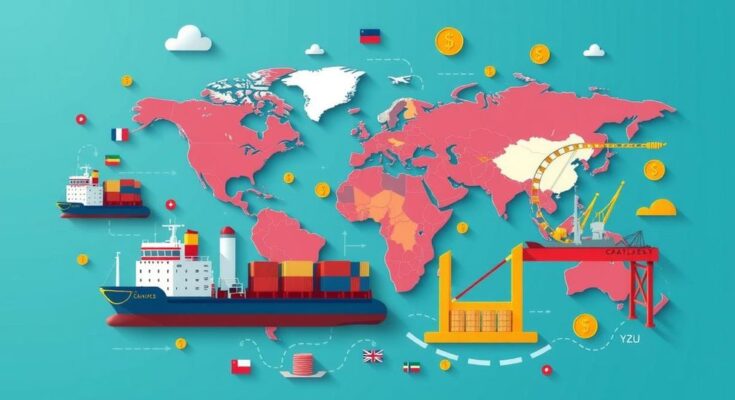On April 2, President Donald Trump will introduce reciprocal tariffs on imports to reduce reliance on foreign goods. These tariffs are argued to protect American industries but may lead to higher consumer prices and global ramifications. Economists caution against broad tariffs, while discussions with countries like India continue without confirmed exemptions.
Since returning to office in January, President Donald Trump has adopted an aggressive stance on tariffs. He has dubbed April 2 as ‘Liberation Day,’ when he intends to implement reciprocal tariffs on imports to reduce reliance on foreign goods. The proposed tariffs will align with the duty rates imposed by other nations and are announced to affect all of America’s trading partners. White House press secretary Karoline Leavitt indicated that further details would depend on the President himself.
Trump argues that the tariffs will protect American industries from unfair competition, generate revenue for the federal government, and leverage concessions from foreign nations. However, economists warn that broad tariffs could lead to higher consumer prices and negatively impact global businesses. These import taxes, coupled with ongoing trade uncertainty, have already unsettled financial markets and diminished consumer confidence.
Although specific details of the tariffs remain undisclosed, they may reflect the rates imposed by other countries, including value-added taxes and domestic subsidies. Peter Navarro, a senior trade adviser, suggested that these tariffs could potentially generate $600 billion, implying an average rate of 20 percent. Past discussions indicate that Trump has contemplated imposing tariffs on countries such as the European Union, India, South Korea, and Brazil.
In relation to India, both nations are reportedly finalizing parts of a bilateral trade agreement. However, no tariff exemptions have been confirmed. Additionally, pending import taxes on Canadian and Mexican goods are set to commence soon. Trump’s Truth Social indicated a delay on tariffs for goods covered by the US-Mexico-Canada agreement will expire on April 2.
Among other impending tariffs, Trump announced a 25 percent duty on oil and gas imports from any country purchasing from Venezuela. This will take effect alongside a 25 percent tariff on automotive imports. Tax collection for continuously imported automobiles will commence at midnight, with additional levies on auto parts to follow.
Existing tariffs include a 10 percent duty on all Chinese imports that began on March 4, meeting retaliatory tariffs from China. The expanded 25 percent tariff on steel and aluminum products is now in effect, while Trump has postponed tariffs on Canada and Mexico for auto-related imports for one month, despite implementing lower rates on Canadian energy products.
With Trump still in office, further tariffs remain a possibility. He has signaled intentions to impose additional duties on products such as copper, lumber, pharmaceuticals, and computer chips. Trump also stated he will not engage in negotiations regarding the tariffs before they are enacted. The European Union has prepared countermeasures against American products, amounting to approximately $28 billion, in retaliation for Trump’s trade policies, set to roll out in phases between April 2 and mid-April.
In summary, President Donald Trump’s impending implementation of reciprocal tariffs on April 2 promises to reshape trade relations with various countries, including India. While intended to protect American industries, the potential economic ramifications raise concerns about rising consumer prices and global business impacts. Observers will closely monitor how these tariffs are structured and the corresponding reactions from affected nations.
Original Source: www.hindustantimes.com




